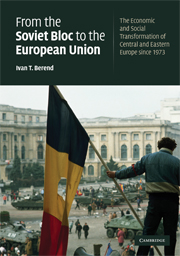 From the Soviet Bloc to the European Union
From the Soviet Bloc to the European Union Published online by Cambridge University Press: 05 June 2012
The year 1989 has become known as the annus mirabilis, or miraculous year. And, indeed, what happened that year was neither predicted nor believable. It surprised the world. State socialism, which had established its isolated bridgehead in Russia after the Bolshevik Revolution of 1917, spread and conquered Central and Eastern Europe after World War II. Besides the Soviet bloc in the eastern half of Europe, it gradually incorporated nearly one-third of the world by the 1980s. The Soviet Union emerged as a superpower with an enormous army and nuclear arsenal. In times of crisis that threatened the system in other countries, such as the 1953 Berlin revolt, the 1956 Hungarian Revolution, the Prague Spring in 1968, or the Afghan crisis in 1979, the Soviet military machine did not hesitate to intervene and “save” socialism. The international military balance of power during the Cold War decades kept the postwar world order intact and, as everybody believed, unchangeable. Moreover, in 1975, the Helsinki Agreement reaffirmed international acceptance and guarantee of the status quo.
By the late 1980s, however, historical changes had rendered impossible a brutal military solution to such crises. Not even hardliners risked open confrontation and the use of force. In situations where force seemed the ultima ratio, they refrained from using it and capitulated. And, in 1989, state socialism peacefully collapsed in Poland and Hungary over the course of a few months, and then throughout Central and Eastern Europe within six weeks.
To save this book to your Kindle, first ensure no-reply@cambridge.org is added to your Approved Personal Document E-mail List under your Personal Document Settings on the Manage Your Content and Devices page of your Amazon account. Then enter the ‘name’ part of your Kindle email address below. Find out more about saving to your Kindle.
Note you can select to save to either the @free.kindle.com or @kindle.com variations. ‘@free.kindle.com’ emails are free but can only be saved to your device when it is connected to wi-fi. ‘@kindle.com’ emails can be delivered even when you are not connected to wi-fi, but note that service fees apply.
Find out more about the Kindle Personal Document Service.
To save content items to your account, please confirm that you agree to abide by our usage policies. If this is the first time you use this feature, you will be asked to authorise Cambridge Core to connect with your account. Find out more about saving content to Dropbox.
To save content items to your account, please confirm that you agree to abide by our usage policies. If this is the first time you use this feature, you will be asked to authorise Cambridge Core to connect with your account. Find out more about saving content to Google Drive.